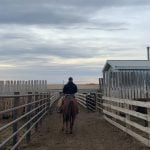BIRCH HILLS, Sask. – Born in Switzerland, raised in Quebec and married in Saskatchewan, Florian Hagmann is used to change.
“I always had the dream to go out West,” said Florian, a 30-year-old farmer who established a purebred Holstein dairy herd at Birch Hills, Sask., after marrying his wife Sharon in 1999.
Now three years and two children later, the farm partners have increased the herd size to 900, including 450 milking cows and 4,200 acres in feeds like barley, corn and oats.
Sharon, 32, a former elementary school teacher, keeps close to home these days caring for an infant and toddler, but works on the books and guides visiting tours from local school and community groups.
Read Also

Bunge to acquire North West Terminal Ltd.
Bunge plans to buy the assets of North West Terminal in Unity, Sask.
She receives much help from her own family, who helped name the farm Milky Way Dairy, and from Florian’s parents and brother.
The senior Hagmanns relocated to the area and help with the farm work. Florian was the age of his son Daniel when the family immigrated to St.-Hyacinthe, Que., from Switzerland in search of a better farm site.
Because the business was unique to the central Saskatchewan area, providing jobs to local workers and buying feed from neighbours, the couple decided it was important to let the community onto the farm, so they held an open house.
Birch Hills is close to where Sharon grew up on the family farm, a stone’s throw from town and minutes from Prince Albert. The farm is on the highway just outside Birch Hills, which makes for easy access for milk trucks. A fenced yard keeps the children safe and contained from the farming operations when at play outside, she said.
Florian spends his days checking prices, overseeing breeding and milking operations and holding regular meetings with his 12 full-time employees.
“The farm cannot be better than its employees are,” said Florian, who makes the completion of a green certificate technician course a condition of employment here.
Initiated by Saskatchewan Agriculture, the course is an apprentice-style program providing hands-on farm training.
“Just so they can have a better understanding of what to do,” he said of the course that touches on everything from sanitation to milking to cow care to farm equipment.
The cows are milked five times over two days in a parlour-style barn. That has increased production by 10 percent and made life easier for staff with better milking times of 7 a.m., 5:30 p.m., 4 a.m., 1 p.m. and 9 p.m.
The parlour was chosen because it uses a small space and can accommodate as many as 24 animals in milking at once. They exit to an expansive shed building where they are bedded on straw and fed a total mixed ration.
The farm is “top-notch,” said Florian, noting automated milkers that detach when done, gates that open at the push of a button, transponders to measure cow activity levels to determine when they’re in heat and carefully guided breeding programs. Manure is injected back into the land.
Florian keeps abreast of trends by attending dairy conferences and reading trade publications.
He prefers dairy cattle over the grain operation he had started here.
The fluctuating prices of grain make it too difficult for a young farmer to get established, he said.
“It’s all right when you’re older and don’t have payments.”
Florian found freight costs high and grain prices low but also found a good availability of feed to buy and grow locally and quota that was much cheaper to buy than in Quebec. He used his equity from the Quebec farm and some bank financing to launch this business.
Of the switch from grain to dairy, Sharon mused that her husband missed his cows. “Once it’s in your blood, it’s always in your blood,” she said.
Florian started farming at age 18 in Quebec, beginning with 130 acres and 30 cows and was up to 150 before he moved. He stayed with Holsteins because they are good milkers and the heifers are easy to sell.
He said it took some persuasion to get financing for a dairy in an area not known for producing milk.
“There is a grain mentality,” he said, noting he had more success with a small town bank than with Farm Credit Canada.
It was especially challenging to finance quota as opposed to a house or land, he said, adding quota has since jumped in price.
“At first, they laughed at us a little bit.”
There was also hesitancy to do long-term financing of quota, which created some cash flow issues in the beginning, said Florian.
He purchased land from farmers whose children did not wish to farm. That troubles Florian, who noted most of his classmates from Quebec went farming.
He said Saskatchewan is lacking the government support through loan programs and training for young farmers that he received in Quebec.
In the future, he would like to organize grassroots farmer groups similar to Quebec’s L’Union des Producteurs Agricoles to discuss issues and lobby government.
“There is a lack of support of one another in the farming community.”
Florian feels Canada’s dairy can compete internationally should the supply management system be scrapped or changed. He is already preparing for that day, with plans in place to establish a second dairy business with partners in South Dakota. He already sells all his heifers there.
Until then, Florian and Sharon are content with the farm size.
“We want to make efficient use of what we have,” said Sharon.
The couple work hard, get along well and share a strong faith in God, said Sharon, who finds rural Saskatchewan a great place to raise children and work.
They stress the importance of having a quality of life on the farm and regular time for family, some of the reasons they created a large farm and hired staff.
Florian enjoys the daily challenges of farm work.
“It’s not like a job. It’s a joy in the morning to get up and go,” said Florian.
Sharon agreed. “We feel God has blessed us with this farm.”














